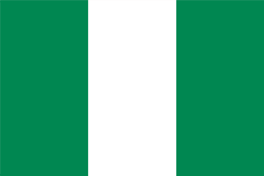 |
FEDERAL REPUBLIC OF NIGERIAIndependence 1 October 1960
History The region in which this West African country is situated – the continent's most populous – was implicated in the slave trade until the 19th century. The territory becomes a British colony in 1914, under a system of 'indirect rule' that is based on traditional authorities and on accentuating divisions between the three main communities: Hausa, Ibo and Yoruba. Nationalism emerges after the Second World War. In 1945, Namdi Azikiwe establishes the National Council of Nigeria and the Cameroons (NCNC) to unify and liberate the country. In 1948, the Macpherson constitution establishes universal suffrage and implements the policy of 'Africanizing' the administration. Obafemi Awolowo's Action Group and Aminu Kano's Northern People's Congress (NPC) support nationalism. Following Queen Elizabeth's 1956 visit and the 1957 London Conference, Sir Abubakar Tafawa Balewa becomes Nigeria's prime minister. December 1959 elections lead to the creation of a coalition government between the two large political parties: the NPC and the NCNC. On 1 October 1960, Nigeria becomes a republic within the Commonwealth; Nnamdi Azikiwe is the president and Sir Abubakar Tafawa Balewa the prime minister. In 1961, after a referendum, part of English Cameroon is integrated into Nigeria. Coups and civil wars destabilize the country, particularly the 30 May 1967 secession of Biafra at the height of the cold war. Mobutu's troops help put an end to it in 1970. Nigeria, the world's eighth most prolific oil producer, remains relatively poor; its political capital, Abuja, has fewer than 500,000 residents, while its commercial capital, Lagos, has more than eight million. Jacob Sabakinu Kivilu (UNIKIN) |


